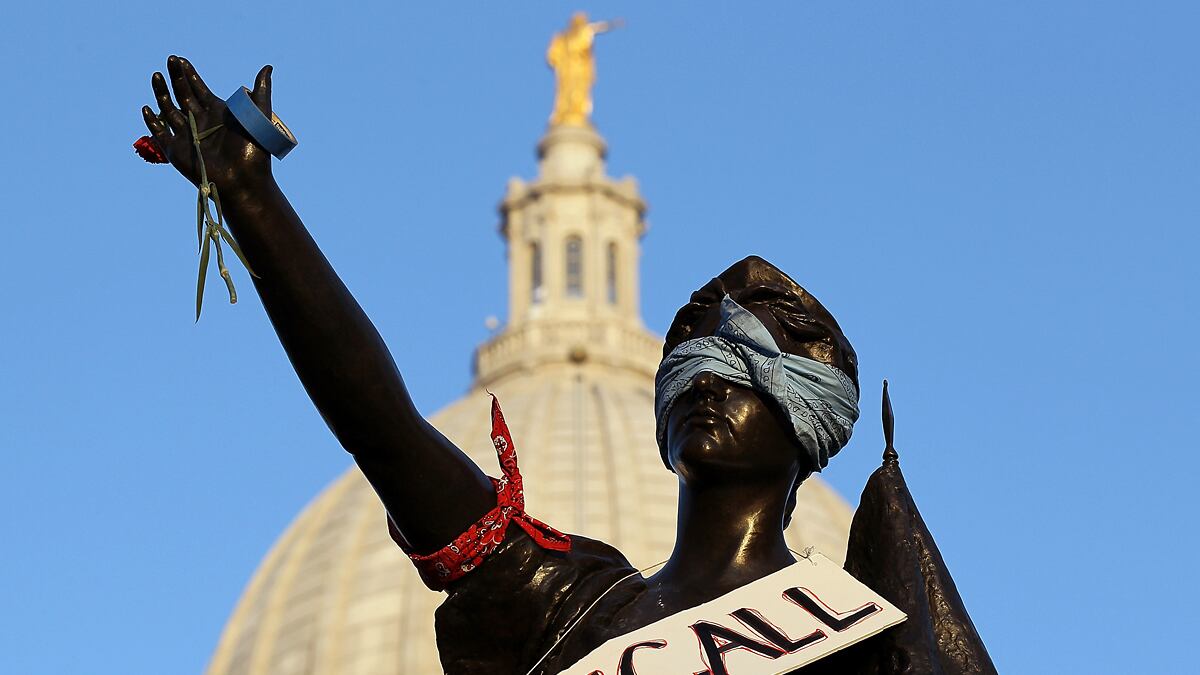Democrats aiming to send a resounding message about the enduring strength of organized labor by recalling Republican Wisconsin Gov. Scott Walker next month have a problem: the candidate backed by nearly every union is poised to lose the primary on Tuesday to the man Walker defeated in 2010.

Walker sparked national controversy shortly after taking office when he proposed—and after months of furious legislative wrangling and public theater, signed—the Wisconsin Budget Repair Bill, which eliminated most collective-bargaining rights for nearly all government workers. The proposal triggered massive demonstrations in Madison by organized labor, and its passage led directly to the recall effort. Intent on showing that they too know how to play on the post-Citizens United terrain and to reverse the tide of state anti-organizing measures that threaten their very existence, Wisconsin and national unions have donated almost $4.5 million to a super PAC backing Kathleen Falk, the former Dane County executive who has pledged to veto any budget that doesn’t restore collective bargaining.
But with just a few days left before the primary, Falk trails 2010 Democratic nominee Tom Barrett, the mayor of Milwaukee, 38 to 21 percent among primary voters, according to a Marquette University Law School poll (considered the most reliable in the Badger State) released last week. Barrett also supports restoring the collective-bargaining rights unions have lost, but has said he’d do so through a standalone bill, an approach that would provide significantly less leverage with legislators.
Falk, who noted in an interview that she has earned “the endorsement of almost every single organization that has made an endorsement in the primary,” is now banking on the hopes that those groups will provide her with a much superior get-out-the-vote operation.
“You would expect Tom to be ahead because he ran for governor two years ago,” said Falk. “Those polls don’t estimate the passion and commitment of these everyday people who have spent a year going door to door doing everything they can to make sure I’m the candidate,” she added, referring to the one million signatures collected by activists to trigger the recall election.
But the effectiveness of unions at organizing the recall petition effort stands in stark contrast to their failure so far to shape the primary campaign. And while Walker’s budget bill, which effectively sapped state Democrats’ political power by gutting unions’ organizing and bargaining muscle, sparked the recall push, it’s not what’s driving the primary contest.
Thirty-eight percent of Wisconsin voters, including a majority of Democrats and more than 40 percent of independents, say the state’s economy has shed jobs over the past year. Among Democrats, 46 percent said “creating new jobs” was the most important consideration in picking a nominee. Despite the anger directed at Walker, just 12 percent of Democrats said "restoring collective bargaining” was most important.
“It’s not that Democratic primary voters don’t want to see collective bargaining restored, because a big majority seemingly do,” said Wisconsin political scientist Charles Franklin, who conducted the poll. “But in terms of the priority for the election, they have almost remarkably come to focus on jobs as the top issue.”
Barrett and Walker are effectively tied in the general election, according to the poll, with the Democrat leading 47 to 46 percent among registered voters, while Falk trails Walker 49 to 42 percent. The numbers suggest Democrats would prefer not to have their party’s nominee easily pigeonholed as a tool of unions. With public opinion of labor near an all-time low nationally and Tea Partiers holding up public-sector workers as a prime cause of the economic collapse and impediment to recovery, Barrett has emerged as the least polarizing candidate in the race.
“It doesn’t appear right now that either party really wants this to be a pure referendum on whether to restore collective bargaining or not,” said Franklin.
Barrett’s pitch—that since he’s already been through the “Tea Party buzzsaw,” as he likes to refer to 2010, he has the best shot at coming out on top this time around—is resonating among Democrats in the state that ranks dead-last in job creation despite Walker’s pledge to create 250,000 jobs and make Wisconsin “open for business.”
“The state’s economy is on hold,” said University of Wisconsin economist Steven Deller, who argued that both Walker’s austerity policies and the political environment have contributed to the state’s anemic job creation. “Michigan always made us look good, but they’re in much better shape than we are now because of the [recovering] automobile industry. The poisonous political rhetoric is causing damage to the state's business climate.”
The Marquette poll shows Barack Obama leading Mitt Romney in Wisconsin by nine points, 51-42 percent, and the recall race has become a bellwether for the November contest, offering a test run for what organized labor might provide Democrats in terms of field operation and logistical support, and a proxy for the question of how large and how generous government should be. A Walker win on June 5 could help Romney close the gap, and would force Obama to expend more resources defending the state and its ten electoral votes.
While the most powerful national and state labor groups like the American Federation of State, County, and Municipal Employees (AFSCME), United Food and Commercial Workers (UFCW), and Wisconsin Education Association Council have lined up behind Falk, they can be expected to work hard on behalf of Barrett should he win the party’s nod and go up against Walker, who has become public enemy No. 1 for labor. It's a high-stakes bet in a tight election: a loss would mean unions backed the losing candidate in both the primary and the general election, which would play into a narrative of political decline and recast the Walker recall effort from a sign of their renewed strength into a high-profile defeat.
One reason Democrats hope Barrett might have more luck in a rematch is the John Doe investigation into several of Scott Walker’s former aides (from his time as Milwaukee County executive). The investigation—which includes allegations that aides conducted political activity on the public dime and embezzled funds intended for a military veterans’ support group—hasn’t publicly targeted Walker. But the governor took the extraordinary step earlier this spring of transferring $60,000 to a legal defense fund, and state law says such funds can only be created by an elected official who has been charged with a crime or is under direct investigation.
To buttress his campaign organization and boost his public image, Walker has raised more money than any candidate for political office in Wisconsin history, including an astonishing $13 million since January. Thanks to a quirk in state election law that permits unlimited donations from the time recall petitions go out until an election date is set, much of the money came from out-of-state Republican megadonors like Las Vegas casino magnate Sheldon Adelson.
Barrett, on the other hand, has raised the least money of the three major candidates, reporting just $475,000 available at the end of April.
“He’s outspent me by 20-to-1,” Barrett said in an interview. “By any objective criteria, he should be crushing me.”
“Democrats know me and trust me,” said Barrett. “Even in the worst environment for Democrats in the state since the 1950s, I held him [Walker] to 52 percent of the vote. He’s governed as though he got 92 percent. He chose to spend his political capital on becoming this national poster-boy for right-wing causes, and in doing that, he took his eye off the prize, which was getting jobs.”






